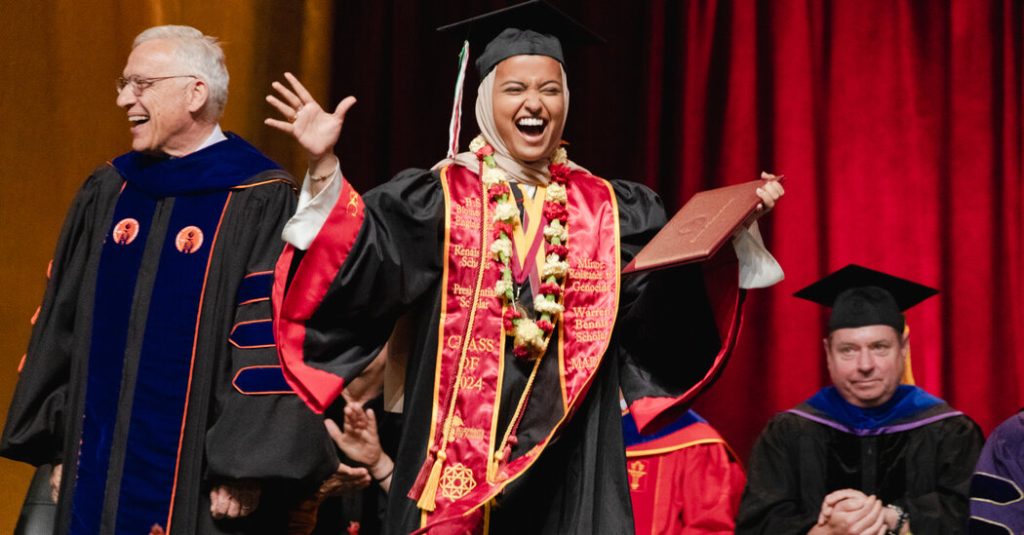Asna Tabassum, the valedictorian at the University of Southern California, became the center of controversy when school administrators deemed it unsafe for her to speak at the commencement ceremony after facing criticism from pro-Israel groups for her support of Palestinians on social media. Despite this, at her graduation ceremony, she received her degree to cheers and applause from students and parents. In a matter of weeks, she went from an unknown undergraduate to a symbol of free speech and a voice for the Palestinian cause, attracting both critics and supporters. While a conservative nonprofit placed a billboard attacking her near campus, she also gained the support of students and academics who believed she was treated unfairly by the university.
Following the cancellation of Ms. Tabassum’s speech, protests erupted over the decision and against the war in Gaza, resulting in a crackdown and 93 arrests by the Los Angeles Police Department ordered by the university president, Carol Folt. Subsequent protests were allowed to continue on campus for days, indicating a softening of the university’s approach, but were eventually shut down without arrests. The dean of the engineering school, Yannis Yortsos, acknowledged the global unrest and commended the students for their dignity, moral compass, and grace in the face of challenging circumstances.
While protests disrupted graduation ceremonies at other universities, the engineering graduation at U.S.C. on Friday proceeded without any drama or visible signs of protest, aside from a few students wearing keffiyehs. Despite the recent turbulence, Ms. Tabassum did not give a speech at the ceremony and declined to speak to reporters, instead appearing like any other graduate, taking photos with friends and cheering with classmates. The Daily Trojan published what was supposed to be her speech, which was mostly blacked out except for congratulations and thanks.
The events involving Asna Tabassum have sparked national attention and debate surrounding free speech and the Palestinian cause. The controversy surrounding her speech at the commencement ceremony has led to discussions about academic freedom, student activism, and the role of universities in addressing social and political issues. As Ms. Tabassum navigates the aftermath of the controversy and continues to advocate for her beliefs, her story serves as a reminder of the challenges faced by students who speak out on contentious issues in an increasingly polarized society.
Overall, the situation at the University of Southern California involving Asna Tabassum highlighted the complexities and tensions surrounding freedom of speech, academic freedom, and activism on college campuses. The response from school administrators, law enforcement, and the public to the controversy reflects broader societal debates and divisions. As Ms. Tabassum moves forward, her experience and the reactions to it will likely continue to shape discussions about the intersection of personal beliefs, academic institutions, and public discourse.


